Home
The "So Far So Close" Festival
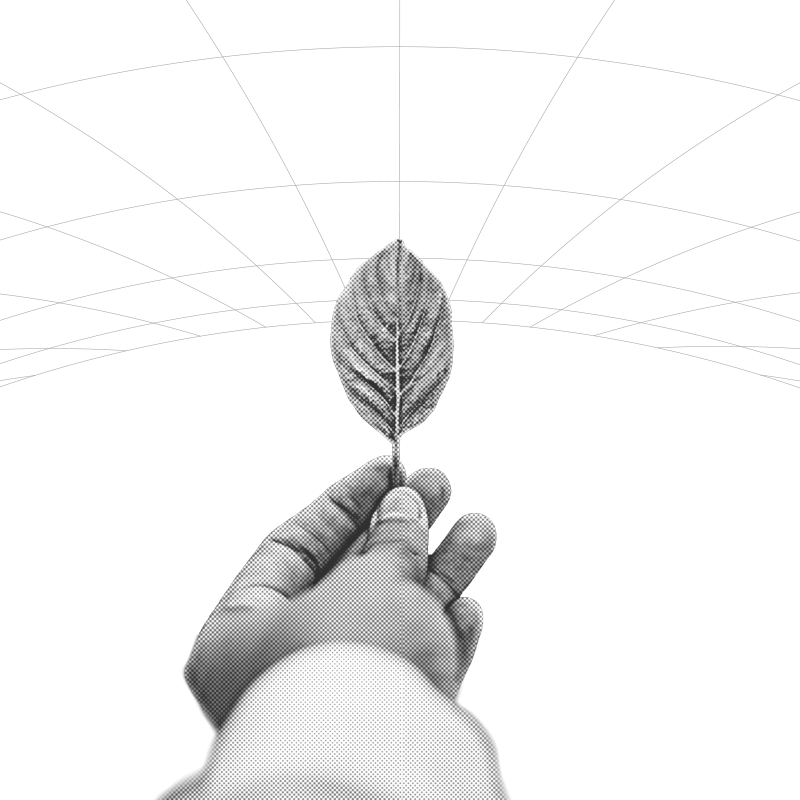
- Immagine condivisione Facebook:

From 12 September to the end of October, Matera and various remote areas of Basilicata Region will be the venues for the “So Far So Close. Esercizi di vicinanza (exercises of closeness)” Festival of Performing Arts produced by the Matera Basilicata 2019 Foundation, with artistic collaboration from Silvia Bottiroli and Cristina Ventrucci, in partnership with APT Basilicata and ASM Matera and under the patronage of the Municipalities of Matera, Montescaglioso, Venosa, San Mauro Forte, Cirigliano, Latronico and San Severino Lucano.
The “So Far So Close" programme offers exercises of closeness as a way of re-embracing the existing reality through the performing arts, with a new awareness of our shared lives in an "infected planet", and rediscovering the force of collective action.
The Festival’s leading artists are Emma Dante, Virgilio Sieni, Chiara Guidi, Annamaria Ajmone, MK, Motus, Deflorian and Tagliarini and Luigi Coppola, who for the occasion take a careful, delicate new look at the relationships created by live meetings. Proximity is a central element of their work, including in terms of the relationship between interpreting reality and constructing the imagination, in which the theatre in all its forms and with all its influences – from drama to performance, from the relationship with the cinema and music to dance and from the experience of public and relational art – becomes a tool for studying relations and places through intertwined narratives, and dedicating attention to the relationship between the human and the non-human and between the visible and invisible in a city that has always brought these dimensions together as its vocation.
In Matera and in Basilicata, we propose exercises for a renewed citizenship, in the wake of the experience that made our land a special place for shared creative processes and the relationship between art and space in the course of 2019.
Through the research carried out by the Open Design School, a project that was a pillar of Matera 2019, the Festival is an experiment aimed at putting on live events in the time of COVID by means of a study of new relationships and codes of social behaviour so that notwithstanding the distance between them, participants in the performance can feel that they are fully involved and protagonists in it. Emblematically, the name "So Far So Close" is an expression both of the work that is intended to be done on the new relations among people in the time of social distancing and the new relations that can be constructed between urban and remote areas.
Quanto dura un anno a Matera?

- Immagine condivisione Facebook:
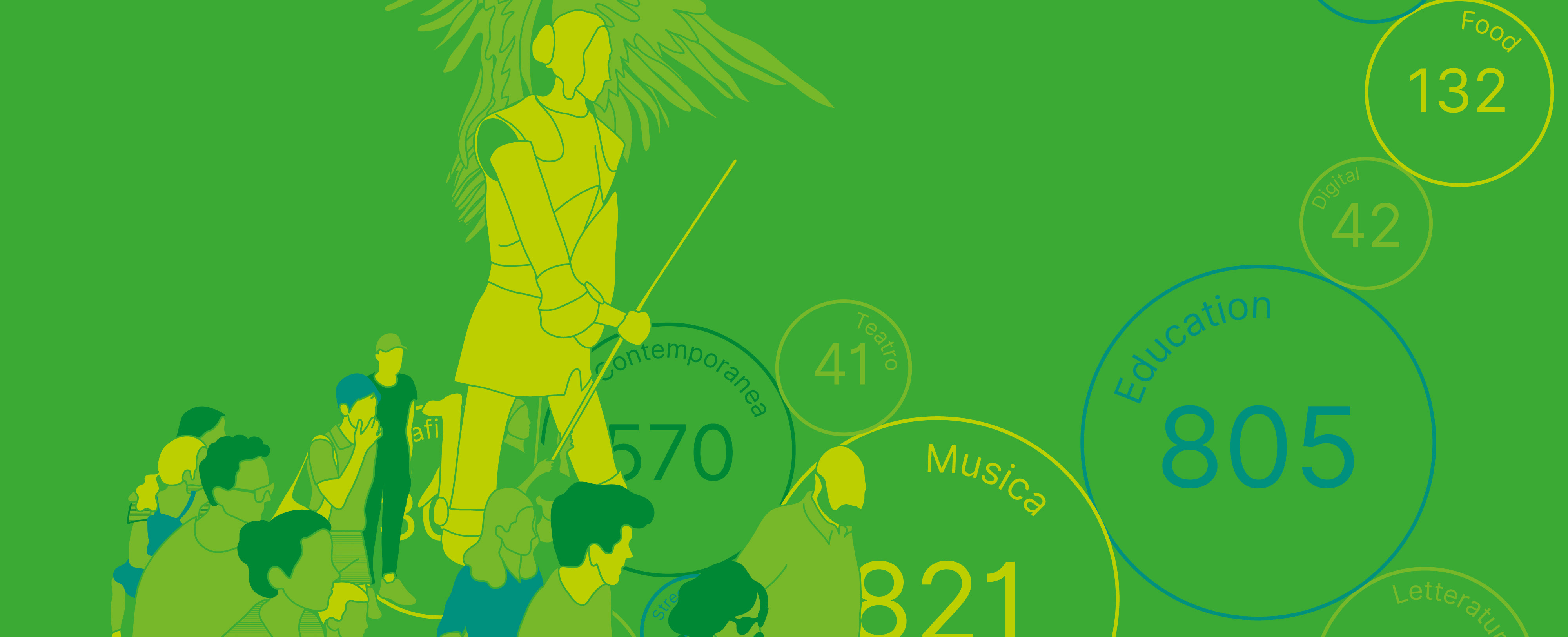
Quanto dura un anno a Matera?
A questa domanda proveremo a rispondere giovedì 30 luglio dalle 17:00 in diretta streaming da Casa Cava con la presentazione del report di monitoraggio dell'anno di Matera Capitale Europea della Cultura e il nuovo portale open data.
Nel corso dell'evento analizzeremo le sfide poste già dal dossier di candidatura di Matera 2019: l'investimento sulle produzioni originali, la cittadinanza culturale, gli impatti sociali.
Parteciperanno all'incontro esperti del terzo settore e della cultura tra cui Carlo Borgomeo (Presidente Fondazione con il Sud), Pierluigi Sacco (IULM), Carola Carazzone (presidente Assifero), Giuseppe Bruno (presidente CGM), Marta Ragozzino (Direzione Regionale Musei Basilicata), Giampaolo d'Andrea (consigliere del Ministro Franceschini), Franco Bianchini (Università di Hull), Rossella Tarantino (Fondazione Matera Basilicata 2019), Paolo Verri, Giuseppe Laterza (Editori Laterza), Marianna Dimona (Comune di Matera), un rappresentante dei produttori culturali di Matera 2019, da poco costituitisi in Comitato. Concluderanno i lavori i rappresentanti del Consiglio di Amministrazione della Fondazione Matera-Basilicata 2019.
Segui la diretta streaming sul canale YouTube di Matera 2019 e interagisci con i relatori!
Al via il FabLab di Open Design School
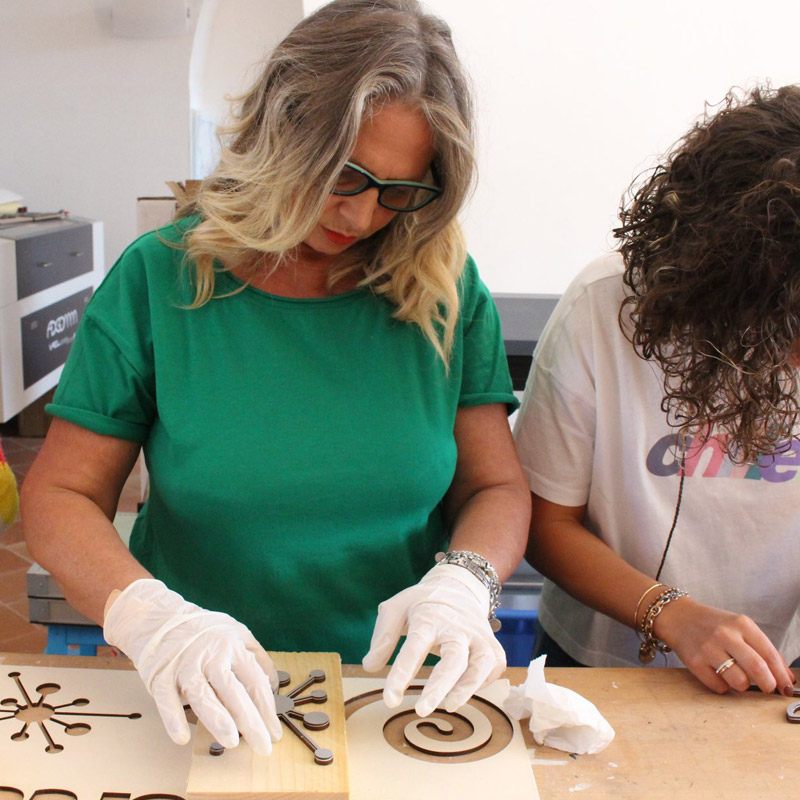
- Immagine condivisione Facebook:
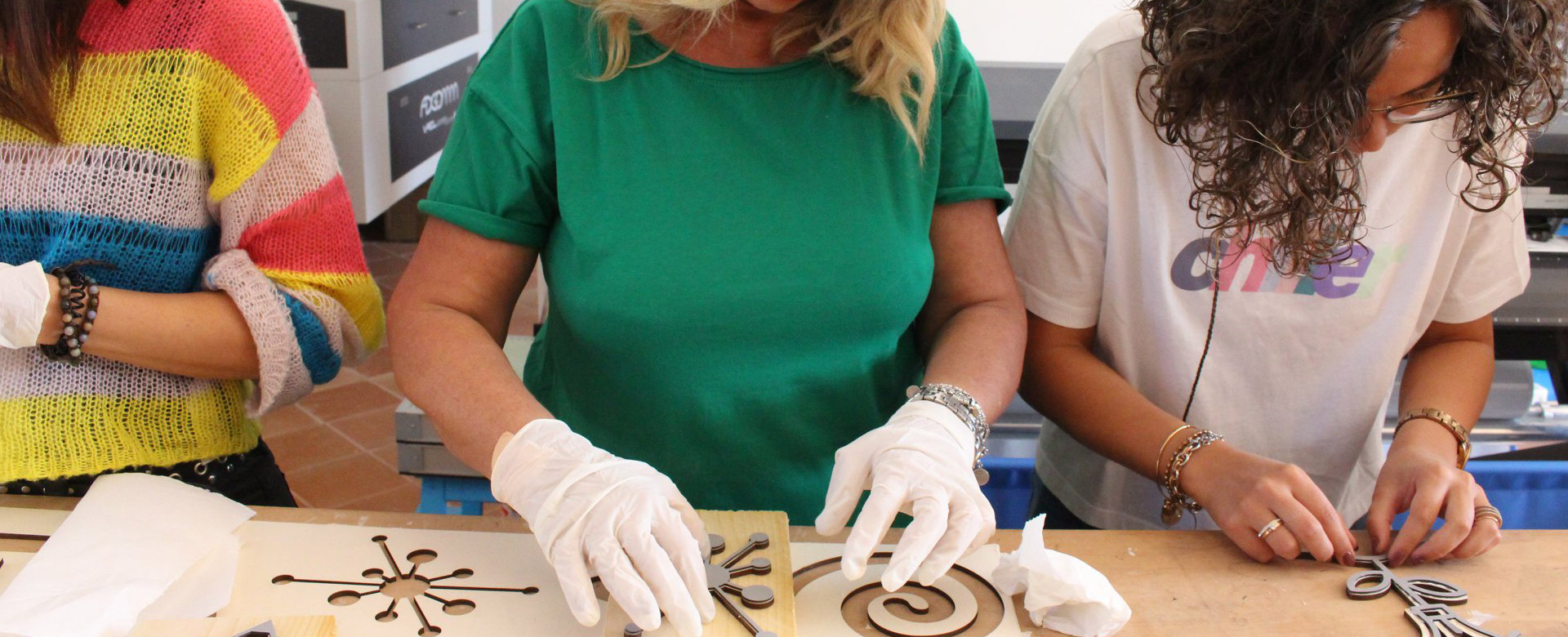
Dal 23 Luglio ripartono le attività laboratoriali presso Casino Padula, con il lancio delle attività del FabLab di Open Design School O.Ma.S. “Open Maker Space”, abbreviato in “O+”, un laboratorio di fabbricazione, analogica e digitale, in cui promuovere la sperimentazione, l’apprendimento, l’invenzione, la prototipazione.
Se sei esperto potrai usarlo come piattaforma di ricerca e sviluppo di progetti, gli utenti occasionali potranno soddisfare esigenze progettuali individuali, le imprese potranno innovare un prodotto o processo, la comunità dei FabLab lo utilizzeranno per attività condivise e senza limiti di età potrai acquisire nuove competenze.
Il FabLab ‘’O+’’ offrirà l’utilizzo di macchinari avanzati, la consulenza su prototipazione e produzione, i corsi di formazione, lo spazio coworking, gli eventi su temi di interesse dell’utenza. Importante sarà la collaborazione con aziende locali e la sperimentazione della formula del FabLab diffuso, che si avvarrà della partnership con la rete di FabLab locali Officine Mediterranee, con cui Open Design School da tempo collabora.
La fase di lancio delle attività, in partenza il 23 Luglio e in programma fino al 7 Agosto, vedrà l’attivazione di workshop gratuiti, il giovedì dedicati ai bambini dai 7 ai 12 anni e il venerdì ai ragazzi dai 13 ai 19 anni.
Le attività che proponiamo sono differenziate per fascia d’età, ma avendo in comune l’approccio non formale, il learning by doing e l’apprendimento tra pari, caratteristiche tipiche dei FabLab e del modello Open Design School. I principali ambiti di formazione saranno il design e la stampa 3D, il coding e la robotica, la fabbricazione analogica e digitale.
Le attività per i bambini dai 7 ai 12 anni si avvarranno di strumenti semplificati, che consentano un approccio alle tecnologie nella forma del gioco e con il raggiungimento di obiettivi immediati. La stampa 3D sarà introdotta mediante l’uso di penne 3D, strumenti che consentono la comprensione della trasformazione fisica della materia e dei principi base della stampa in modo diretto e per mezzo della manualità del bambino. Il disegno 3D al computer utilizzerà il software TinkerCAD, pensato per avvicinare i più piccoli ai principi del disegno virtuale. Il coding sarà applicato all’interazione con semplici robot autocostruiti e alla realizzazione di storie di fantasia in ambienti in cui l’architettura avrà un ruolo fondamentale. Saranno inoltre sperimentate applicazioni ludiche di Arduino.
Con i ragazzi dai 13 ai 19 anni impiegheremo anche gli strumenti tecnologici disponibili in laboratorio, come la vinyl cutter, le stampanti 3D, il taglio laser. L’obiettivo è quello di sviluppare in loro la volontà di proporre e produrre, collettivamente, progetti originali nei campi della tecnologia, del design e dell’architettura mediante l’utilizzo di software professionali e kit Arduino.
I workshop si terranno a Casino Padula il giovedì e venerdì, dalle 18:00 alle 20:00, e saranno accessibili ad un massimo di 8 utenti.
Per l’iscrizione è necessario inviare una mail all’indirizzo This email address is being protected from spambots. You need JavaScript enabled to view it. entro il martedì precedente al workshop di interesse.
Di seguito il calendario con le attività:
Giovedì 23/07, ore 18.00 - 20.00 - Bambini 7-12 anni SOLD OUT
Graffiti: utilizzeremo la pittura parietale come esempio di produzione per sottrazione. Realizzeremo un telo, decorato in gruppo con colori a tempera e cartoncini decorati con pastelli a cera per rimozione di strati.
Output: Telo decorato in gruppo e cartoncini personalizzati.
Venerdì 24/07, ore 18.00 - 20.00 - Ragazzi 13-19 anni SOLD OUT
Decoreremo le tazze Matera 2019 con il pattern ODS e il logo O+.
Output: tazze decorate da portare a casa.
Venerdì 31/07, ore 18.00 - 20.00 - Ragazzi 13-19 anni SOLD OUT
Disegno 3D con TinkerCAD
Un’introduzione al mondo CAD 3D mediante un software online gratuito che permetterà di comporre geometrie solide predefinite per ottenere oggetti anche complessi. Adatto a tutti, anche a coloro che non hanno esperienza con i software CAD e desiderano avvicinarsi al design 3D in modo semplice e intuitivo.
Output: un modello virtuale tridimensionale che sarà riprodotto in stampa 3D nell’appuntamento successivo.
Sabato 01/08, ore 10.00 - 12.00 - Bambini 7-12 anni SOLD OUT
Disegno 3D con TinkerCAD
Un’introduzione al mondo CAD 3D mediante un software online gratuito che permette di comporre geometrie solide predefinite per ottenere oggetti anche complessi. Adatto anche ai bambini, darà la possibilità di acquisire concetti quali la spazialità e la prospettiva.
Output: modello virtuale di un oggetto.
Giovedì 06/08, ore 18.00 - 20.00 - Bambini 7-12 anni SOLD OUT
Con l’utilizzo delle penne 3D creeremo oggetti tridimensionali per un’esperienza di gioco che consentirà ai bambini di acquisire in modo semplice concetti complessi, quali la geometria dello spazio e i principi del disegno e della stampa 3D.
Output: oggetti 3D in plastica ecologica da portare a casa.
Venerdì 07/08, ore 18.00 - 20.00 - Ragazzi 13-19 anni SOLD OUT
Stampa 3D
Una panoramica sulla stampa 3D, i principi di funzionamento e i campi di applicazione. Utilizzeremo la stampante 3D a filamento plastico per realizzare un modello e mostrare come avviene la costruzione di oggetti.
Output: oggetto modellato nel workshop del 31/07.
Tutti i workshop si svolgeranno nel rispetto della normativa anti-Covid, pertanto gli utenti avranno l’obbligo di indossare la mascherina e saranno sottoposti alla rilevazione della temperatura in ingresso.
A new team for Open Design School!
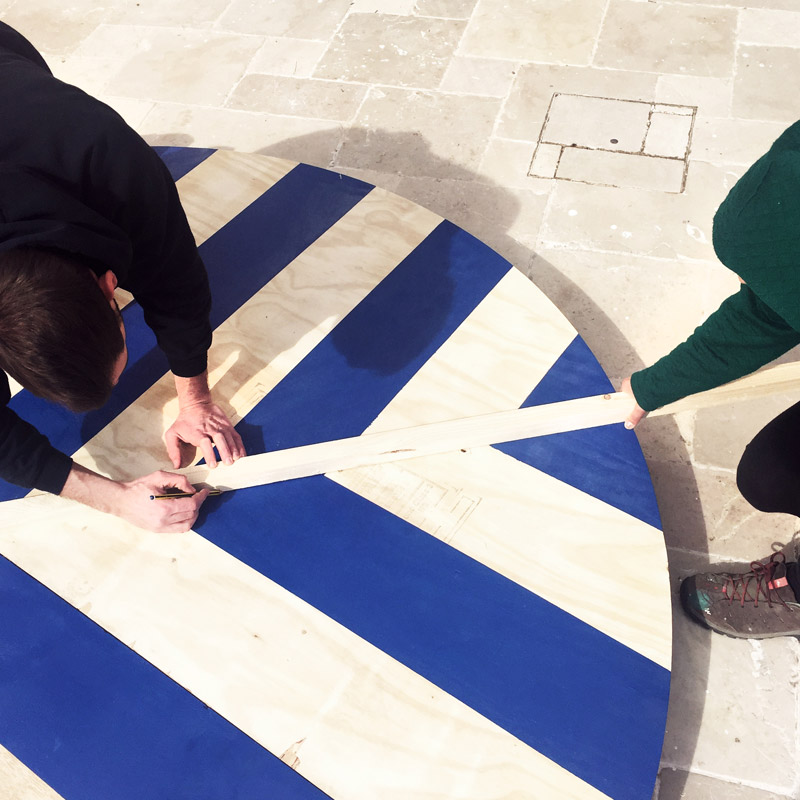
PUBLIC NOTICE FOR THE SELECTION OF EXPERTS FOR THE CREATION OF NEW SPATIAL FORMATS FOR LIVE EVENTS AS PART OF THE “SO FAR, SO CLOSE” FESTIVAL
(updated 14 August 2020)
After careful selection of the 60 applications received, we welcome the 6 new professionals who will join the new Open Design School working group:
Immacolata Alianelli, Designer, Matera
Vito Battista, Visual Designer, Noicattaro (BA)
Francesco Angelo Convertini, Designer expert in self-construction, Locorotondo (BA)
Francesco Lipari, Designer, Campofranco (CL)
Grazia Mappa, Designer, Grottaglie (TA)
Saverio Massaro, Social Designer, Altamura (BA)
---
(REGISTRATION DEADLINE BY 11:59 pm, 27th OF JULY 2020)
Open Design School, the Matera-Basilicata 2019 Foundation design department, is launching the selection of a new multidisciplinary team for the design of new spatial systems and the rethinking of social relations for live events, within the limits imposed by the current pandemia.
The resulting projects, developed together with the artistic team, will be carried out as part of the “So Far, So Close” festival, conceived and created by the Matera-Basilicata 2019 Foundation, that will generate an open source toolkit to facilitate experimentation accessible to all.
OPEN DESIGN SCHOOL
The Open Design School is a laboratory of interdisciplinary experimentation and innovation, born as a pillar project at the service of the cultural program of Matera 2019, and a fundamental part of the legacy of the European Capital of Culture.
It is a horizontal platform, with no rigid hierarchies, that promotes a peer-to-peer and learning by doing approach in a climate of mutual enrichment.
more information here: website - manual
RATIONALE “SO FAR, SO CLOSE”
The Matera - Basilicata 2019 Foundation remains focused on the aims set out in the candidacy dossier of Matera as European Capital of Culture 2019, with particular reference to the wealth and diversity of cultures in Europe, the promotion of culture and the development of cities.
Up until the end of 2022 the Foundation will be committed to consolidating legacy, strengthening the position of Matera and Basilicata within the creativity sector to become a cultural platform in Southern Italy.
As part of this strategy, the “So far, so close” festival is dedicated to the co-creation of live events and public art projects, with a strong regional dimension, through a co-creation process activated by the Open Design School.
Specifically, the Open Design School method provides workshops to bring together professionals from different disciplines from the world, Italy and Basilicata: from epidemiologists to security engineers, from designers to carpenters, from architects to artists to the public itself. It is a research project about new forms of relations and codification of social behaviors, to ensure that, despite the distance, participants in a performance feel fully involved and protagonists of the event, by applying the logic of co-creation,the flagship of Matera 2019.
The projects will cover different thematic areas according to the specificity of the festival venues: suburbs, provincial areas, natural areas and great cultural spaces, such as “Cava del Sole”, a highly iconic space for Matera 2019.
The working group will be coordinated by the ODS team and will work in collaboration with the festival's curator, performers and other experts to creatively face the challenge of planning public events in the time of COVID.
ACTIVITY CALENDAR
03 - 07 August
warm-up
intensive design workshop for the definition of the project guidelines (online attendance is allowed for foreign nationals)
24 August - 30 October
applied research
production of spatial installations, wayfinding and coding of social and spatial relations, study of flows, creation of the open source manual (attendance required).
WHO ARE WE LOOKING FOR
The workgroup will be composed of 5 professionals to be selected from the following areas of specialization (check “Call for the creation of an open list of experts of Foundation Matera-Basilicata 2019”, Annex 1 “Specialization areas and income ranges”):
- 2 architects, experts in festivals and events set-up, accessibility, tactical urbanism and landscape [cat.E10]
- 1 designer, expert in self-construction, digital and / or analogical fabrication, DIY and hands-on approach [cat.E10]
- 1 service / social designer, expert in design relations and / or in facilitation of processes [cat.E10]
- 1 visual designer [cat.E11]
The selected participants will be approximately 1/3 from Matera and Basilicata, 1/3 from the rest of Italy and 1/3 from abroad.
WHAT WE ARE LOOKING FOR
Full-time commitment.
Residency in Matera is mandatory.
Ability to work in multidisciplinary teams.
Good attitude towards sharing.
Knowledge and appreciation of Open Design movement values.
A passion for Matera!
Foreign national professionals (only) can choose to participate online to the warm-up phase.
WHAT WE OFFER
Contribute towards the consolidation of the legacy of European Capital of Culture 2019 and to the national and European debate on new ways to enjoy culture.
Participation in experimental and multidisciplinary research regarding the planning of live events.
Access to a digital and analogue prototyping laboratory to test and self-produce the imagined solutions.
The opportunity to work with a varied creative team, in close contact with the curator, performers, artists and specialized technicians to find innovative answers to a highly topical theme. The opportunity to discover numerous venues of the Basilicata region.
A gross fee total of € 3500 + IVA and/or social and fiscal contributions borne by the Foundation Matera-Basilicata 2019, to be paid on a monthly basis.
Travel expenses reimbursement for foreigners (only) up to a maximum of € 500, for physical participation during the warm-up phase.
HOW TO PARTICIPATE
Participation to this selection requires registration to the “Open list of experts of Foundation Matera-Basilicata 2019”.
In addition, all interested parties are invited to send their portfolio and motivational letter, to the following e-mail address: This email address is being protected from spambots. You need JavaScript enabled to view it..
All communications must be received, under penalty of exclusion, no later than 27 July 2020 at 11:59 pm. All the documents must be signed.
For all information regarding how to apply, minimum access requirements and selection procedures, refer to the “Call for the creation of an open list of experts of Foundation Matera-Basilicata 2019”.
Please note that the CV can also be uploaded in a non-European format.
If you are already registered on the portal, please check the status of your registration and, if needed, proceed with the renewal.
Application to the selection as specified above, does not give rise to any right or expectation that the subject may obtain a professional assignment of any nature from the Foundation Matera-Basilicata 2019.
SELECTION PROCEDURE
The selection will take place through comparison and evaluation of the curricula and subsequent interview for experts deemed to possess the technical and professional requirements for this notice.
CLARIFICATIONS
For more clarifications about the project, interested parties can send an email to This email address is being protected from spambots. You need JavaScript enabled to view it.
INFORMATION AND ADVERTISING
This Notice, as well as the results of the comparative procedure, will be appropriately advertised on the institutional website and on the Matera-Basilicata 2019 Foundation dedicated social media.





